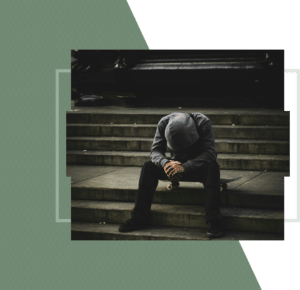

There is little more miserable than being in the throes of addiction. Buddhist iconography pictures it best as being trapped “in the realm of hungry ghosts” – creatures afflicted with starvation but only capable of eating a single grain of rice at a time. Addiction feels like that, and worse. It creates mountains of shame, regret, missed opportunities, and damaged relationships. Whether it’s alcohol, drugs, or gambling, gaming, and pornography, addiction steals your vitality.
Addiction is not a life-sentence, you can beat it. While being trapped by addiction is one of the great forms of suffering, being free of it is a tremendous liberation – waking up each day not hung over with energy and clarity, no longer having to hunt down a supplier, no more lying, no more excuses for missed opportunities or broken promises. To be free to focus on what matters in life and invest in long term forms of happiness and fulfillment.
Of course, when you’re in the chains of addiction or compulsive behavior, that freedom feels so far away. It’s hard to remember, let alone envision, a life free from restraints that addiction puts on you. But it absolutely is possible and asking for help is often the first step.


While it’s absolutely true that you can recover from addiction, how to do so can be complicated. There are an awful lot of competing theories about what addiction is and how to heal it. Our approach specializes in tailor treatment to you, not you to a model. Practically speaking, that means that some people benefit tremendously from AA or 12-step models with therapy. For others, those models are off-putting and they need a more specialized plan. Some people need an accountability coach, some need to heal the trauma that causes addiction, and others need a place to understand how addiction impacts them and practical tools to rebuild.
Let’s bring this to life and understand how this may play out. Imagine that two folks come to treatment for drinking, Carlos and Selena. Both worry their drinking is out of control, have faltering relationships due to alcohol, and have severely damaged their work reputation. Both have just gotten a DUI and been mandated to attend AA meetings. They are seeking therapy because they have a sense they need something else.

Carlos feels out of control in his life in all sorts of areas. His family’s business is struggling and he feels intensely responsible for their success. In therapy, we come to understand that as the eldest son of an immigrant family, his sense of responsibility is so strong that it’s almost paralyzing.
Therapy focuses on helping him understand this and navigate it more realistically. AA also works well for him – he loves the messages of “letting go and letting God” and the meetings offer structure and organization to his life in addition to therapy. The therapist understands his need for structure and offers lots of concrete skills and exercises. His drinking reduces and soon disappears entirely.
Selena has a very different experience with recovery. She grew up in an oppressive religious environment in which she was forced to go to Church regularly. A bright kid, she was often punished for questioning too much and, especially as a young woman, told to “be easier.” AA drives her bonkers – she hates the religious/spiritual element and it’s dominated by men who often make passes at her in spite of the rules.
Luckily, the therapist clocks this and understands she needs a lot more space to process the trauma of having her voice and experience silenced throughout her life. Most sessions focus on unpacking how constricted she feels at work and in relationships, and then how to skillfully communicate her needs and weed out toxic relationships. As these aspects of her life improve, her drinking reduces because she feels less anxiety, more powerful, and less restricted.

While these are fictionalized accounts, they aren’t far from the stories we see everyday. They illustrate that what is good for the goose is not always good for the gander, and that therapy’s great superpower is to be able to address each unique individual in all their complexity while helping them get where they need to go.
In the first session, you’ll talk about what brought you to therapy and what you hope to achieve. Your therapist will likely ask questions about your experiences and listen carefully to tailor an approach that feels right for you. It’s a chance to get comfortable and see if it feels like a good fit.
The benefits of therapy for substance abuse are widely acknowledged. Effective therapy provides individuals with the tools and strategies needed to overcome dependency and rebuild their lives. For example, one approach, motivational interviewing, is particularly beneficial because it is highly individualized and helps balance responsibility with autonomy.
Therapies that emphasize the development of personal skills and resilience, such as stress management and life skills training, are invaluable for individuals in recovery. Through these therapeutic practices, individuals learn to navigate life’s challenges without relying on substances, enhancing their overall quality of life and promoting lasting sobriety. The support and guidance of a qualified therapist can make a significant difference in the journey toward recovery, offering hope and a pathway to a healthier future.
The best psychological treatment for addiction often combines several approaches to address the complex nature of substance dependency. No one therapy is the best for everyone. Our approach to addiction treatment often includes interventions from multiple different types of therapy, such as behavioral therapies, like cognitive-behavioral therapy (CBT), motivational interviewing, and interpersonal therapy. Behavior therapies work by helping individuals to recognize and change maladaptive behaviors and thought patterns that contribute to their addiction. In addition to behavioral therapies, comprehensive addiction treatment may also integrate other therapeutic modalities, especially interpersonal therapies that help people build better, more robust, support into their lives and limit self-destructive patterns. This holistic perspective ensures that both the psychological and social aspects of addiction are addressed, facilitating a more sustainable recovery. The goal of these treatments is not only to help individuals abstain from substance use but also to improve their overall mental health and well-being, enabling them to lead fulfilling lives post-recovery.
When searching for an addiction therapist, it’s crucial to find someone who understands the depth of addiction recovery. A therapist skilled in navigating relationship issues, employing various coping strategies, and integrating methods such as harm reduction therapy as well as abstinence based therapies can be most helpful. They should have a profound understanding of how addictive behaviors manifest, be able to tailor the therapy for addiction to your unique needs, and provide a safe, non-judgmental space to heal the impact addiction has on your life and on your loved ones.
Additionally, the benefits of therapy with a professional who has a robust background in therapy more broadly cannot be overstated. This includes a therapist’s ability to address grief, enhance communication skills, and facilitate the development of healthier habits. The ideal therapist will provide a supportive environment where you can explore the underlying causes of your addiction and work collaboratively towards recovery.
Psychologists and other therapists treat addiction by employing evidence-based practices to help individuals develop coping skills and manage their addictive behaviors. Therapists may use cognitive-behavioral therapy (CBT) to assist patients in recognizing and changing thought patterns that contribute to their addiction, interpersonal therapies to understand the roots of our behavior and patterns, and trauma-informed modalities to trace how addiction is often used to medicate and manage unresolved trauma. By focusing on the psychological triggers of addiction, psychologists aim to empower their patients with the tools needed to maintain long-term recovery.
Additionally, therapists may incorporate other therapeutic techniques such as motivational interviewing and relapse prevention strategies to support addiction treatment. Through individualized treatment plans, psychologists address the mental, emotional, and sometimes physical aspects of addiction, ensuring a holistic approach to recovery.
Addiction profoundly impacts several areas of the brain, including the reward system, primarily through the nucleus accumbens, which plays a significant role in the pleasure and reward feelings. The prefrontal cortex, responsible for decision-making, impulse control, and self-regulation, is also significantly affected. This impairment can lead to the compulsive behaviors often seen in addiction.
Furthermore, the amygdala and hippocampus, which are involved in stress response and memory, respectively, are altered by addiction. These changes can associate certain environments or emotional states with substance use, making recovery challenging. Understanding how addiction affects these brain areas can help in developing targeted treatments to support recovery.
The most common therapies for substance abuse are cognitive-behavioral therapy (CBT), motivational interviewing (MI), and interpersonal models. CBT focuses on identifying and changing negative thought patterns and behaviors associated with drug and alcohol use. It equips individuals with strategies to deal with cravings, avoid triggers, and maintain sobriety. CBT is highly effective due to its adaptable nature, making it suitable for a wide range of individuals and types of substance abuse. MI focuses on helping patients harness and understand their own motivational patterns and potential for change. MI is particularly effective in addiction treatment because it doesn’t stigmatize substance use, is deeply respectful of people’s choices, and meets people where they’re at. Interpersonal models are also helpful because conflict with others, difficulties in relationships, and our views of ourselves are all connected to relationships, past and present. Managing this aspect of one’s life more effectively makes recovery much stronger and more sustainable.
Additionally, these are often combined with other approaches. This includes group therapy, which provides social support and helps in building communication skills, and family therapy, which addresses family dynamics and improves relationships.
The frequency of therapy sessions varies depending on individual needs and the specifics of their addiction treatment plan. Initially, more frequent sessions, such as once or twice a week, may be beneficial to establish a strong foundation for recovery and to begin addressing aspects of life impacted by addiction. This can be crucial for developing healthier habits and gaining insight into addictive behaviors.
Over time, as you develop strategies for managing cravings and improve your communication skills, the frequency of individual therapy sessions may decrease. It’s essential to work closely with your substance abuse counselor to determine the most effective schedule for your therapy. Regularly assessing your progress and adjusting the frequency of sessions ensures that the therapy remains responsive to your evolving needs.
Not necessarily. Group support is often helpful in recovery, but it’s not required. AA is a tremendous help to some, questionably or partially helpful to others, and disastrous for the remainder. The advantage of individual therapy in recovery is its flexibility and adaptability, as well as the personalized attention and care you receive. Your therapist may suggest exploring AA as an adjunct to treatment but it will not ever be a requirement. There are also alternatives to AA that may be better suited to you, such as Rational Recovery. Furthermore, there are group therapies that can fulfill the role of group support.
Small Changes Can Lead to Big Results
Contact us today to schedule a consultation and explore how anxiety therapy can help.
Call us for a free 20-minute consultation. Get your questions answered and understand the next steps.
Book A Consult
Contact us today to schedule a consultation and explore how therapy can help.
